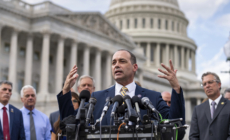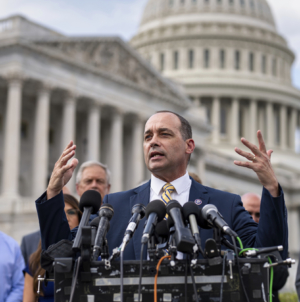-
Outgoing House Republican: ‘The Less’ Congress Does, ‘The Better’ - 19 mins ago
-
Syria’s New Leaders Balance Huge Struggles Amid Disorder - 42 mins ago
-
Back-to-Back Bomb Cyclones Could Hit US - 54 mins ago
-
South Korea President Yoon Defends Martial Law Decree in Defiant Speech - about 1 hour ago
-
Luigi Mangione May Face Additional Charges, Alvin Bragg Says - about 1 hour ago
-
L.A. council backs $30 minimum wage for hotel and LAX workers - 2 hours ago
-
Jimmy Butler Agent Goes Off on Shams Charania Following Trade Destination Report - 2 hours ago
-
Labor Board Classifies ‘Love Is Blind’ Contestants as Employees - 2 hours ago
-
Hate crimes in L.A. County hit an ‘unacceptable’ all-time high in 2023 - 2 hours ago
-
Congress Could Change Social Security Penalties: Here’s Who’s Impacted - 3 hours ago
Congress Could Change Social Security Penalties: Here’s Who’s Impacted
Congress is running out of time to pass a new Social Security bill that would repeal a penalty that has been plaguing millions of seniors when it comes to their monthly benefits.
Americans earn Social Security benefits upon reaching retirement age, but some workers face stiff penalties if they work as public servants.
This includes teachers, firefighters, police officers and their spouses, all of which deal with the impacts of the windfall elimination provision (WEP) and the government pension offset (GPO).
“A decades-old provision has kept a select group of Americans who had family members in public service professions from receiving full social security benefits,” Alex Beene, a financial literacy instructor for the University of Tennessee at Martin, told Newsweek. “Unfortunately, it’s looking less likely for it to pass this year.”

Justin Sullivan/Getty Images
The WEP affects people with less than 30 years of significant earnings from employment covered by Social Security if they also get a “non-covered pension.”
Meanwhile, the GPO lowers the benefits for spouses of those receiving a non-covered pension by around two-thirds.
The Social Security Fairness Act, which was proposed by Republican Louisiana Representative Garret Graves and Virginia Democratic Representative Abigail Spanberger and would repeal both rules, received full bipartisan approval 327-75 by the House of Representatives in November.
This month, however, the Senate is running out of time to repeal the rules behind the penalties, which currently impact nearly 3 million retirees.
“We have serious legislation that would help millions of Americans waiting for a vote,” Republican Louisiana Sen. Bill Cassidy said on the Senate floor Monday. “We can repeal two unfair provisions if the majority leader schedules a vote.”
Graves has also pushed for the approval of the law before he exits Congress next year.
“This was a hard-fought battle for the most popular bill in Congress. Our bill is equally popular in the Senate and should enjoy the same success,” Graves said earlier this month.
The current pushback against the Social Security Fairness Act centers on how the law would impact the Social Security Administration financially. The agency is already under financial strife as it faces insolvency as early as 2035 without policy changes.
“Some critics argue that removing these provisions could lead to ‘double-dipping,’ allowing individuals to receive both full Social Security and full pension benefits, which some feel could result in receiving more than their fair share,” Kevin Thompson, a finance expert and the founder and CEO of 9i Capital Group, told Newsweek.
If the bill does not get voted on before December 31, which is the end of the second session of Congress, the law will effectively die.
Because Democratic legislators in the Senate have been prioritizing approval of President Joe Biden’s judicial nominees, the widely supported bill may not have a chance to get voted on this month.
“The reality is Democrat legislators have different priorities before losing control of Congress, and that sadly means it will more than likely be next year before we see further movement to help these individuals,” Beene said.
Source link



















